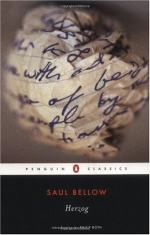|
This section contains 2,375 words (approx. 6 pages at 400 words per page) |

|
Bellow's characteristic fiction is, in Bakhtin's terms, a representation of discourse. His Herzogs, Sammlers, and Cordes are images of distinct ways of talking and thinking about the world. Each is a life-position, a structure of valuation; each is also a formal construction of reality, directed toward a particular shaping of the world. But it is here, also, that the self begins; Bellow understands the modern self as formed in discursive consciousness. We know ourselves as a specific discursive practice, and we know the world as that practice forms it for us. That, for his central characters, is where they find themselves at the start of their narratives. For Bellow, this is the inwardness of modern Western humanity, within a specific discursive practice. It is for that reason that Bellow's novels start from thought, discourse, and self-reflection, rather than from event or social relationships.
But with this inwardness...
|
This section contains 2,375 words (approx. 6 pages at 400 words per page) |

|




